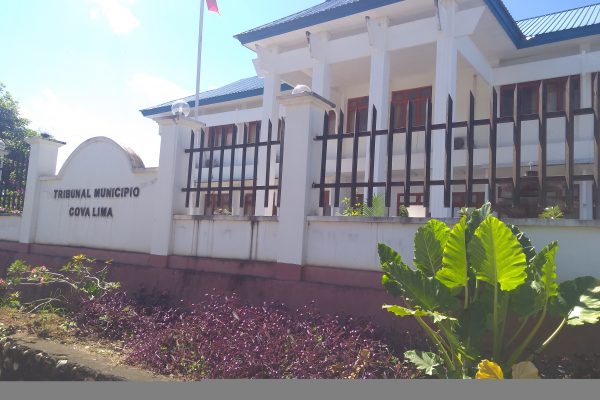Kara Woods. Kara is a 2L at the Sandra Day O’Connor College of Law at ASU. She serves on the Journal of Social Science. Kara interned on the Legal Research Unit at the Judicial System Monitoring Program in Dili, Timor-Leste, during the summer of 2019.
My day started at my desk at the Judicial System Monitoring Program (JSMP), where I was figuring out Timor-Leste’s history with the 2010 Kampala Amendment to the Rome Statute, which it has not ratified. The research involved a lot of academic articles on the purpose and process of amending an international treaty, and it took my ASU Law training to get through the dense reading.
After lunch, the day changed when we were asked if we wanted to go to the courthouse to listen to a trial in an anti-corruption case. The other ASU Law interns and I jumped at the opportunity, especially since two of us were working on anti-corruption projects. We walked to the courthouse with Mana Rosia, who took us through the most winding streets we had seen yet, all much too narrow for a car or even a motorbike to navigate. (In Tetum, “Mana” and “Maum” mean “sister” and “brother” respectively, and are terms of respect used for everyone from co-workers to strangers.)
None of the men we passed wore shirts, and neither did most of the children. No one wore shoes. Many people along the route greeted Mana Rosia by name, and everyone waved to us and greeted us with a friendly “Buon tarde!” We emerged from the maze of habitations and two blocks later were stepping into the courthouse.

White and open-air, the old Portuguese building was striking. As we entered through the main arch, we saw rooms on either side. Lawyers for the defense went to the left, as did defendants waiting for trials and sentencing—the former to offices and the latter to a locked room. Prosecutors went to the right. A central courtroom stood in the middle of a square, surrounded by buildings. Several side rooms held hearings and sentencing. Two witnesses in the case we came to see were to testify in the central room.
Court was in session, so we crept in and seated ourselves quietly in the gallery. We looked across the courtroom to the three judges, who wore familiar black robes with unfamiliar yellow jabots and scarves. To the judge’s right sat the prosecutor. Each sleeve ended in a red cuff and a red collar was stitched into the black robe. Red and yellow have special meaning sin Timor-Leste, especially when worn by government officials. Yellow represents the traces of colonial past and red the struggle for national liberation. The Timor-Leste flag hung on a stand behind the prosecutor.
The defense attorneys’ robes were black, with none of the decorations afforded the judges or prosecutors. Four lawyers—one Portuguese and three Timorese—sat together on the defense side. They were divided into two teams, one for each of the companies fighting the corruption charge.
Everyone in the courtroom wore headphones. According to Mana Rosia, only one court translator worked at a time, and that person had to translate the Portuguese into Tetum, and the Tetum into Portuguese. Making the process even slower was the court schedule: the judges were hearing only two witnesses in the case that day, and they would continue questioning on another day, probably the following month.
When the questioning ended, Mana Rosia took us out to the main entryway and had us wait for her while she listened in on the sentencing of another case, one that was not open to the public. She came back looking sad.
The case she was investigating was an incest case in which a father had allegedly raped both of his daughters. The minimum sentence, according to the law, should have been eight years in prison, but somehow he got off with only six years and the chance for parole. We tried to understand what might have led to the reduced sentence, and Mana Rosia told us that the victims wanted a light sentence for their father. They did not want him to go to jail but only wanted him to stop harming them. Medical testing proved that the elder daughter was pregnant with her husband’s child, not her father’s, and the prosecutor could not object to the ruling because he did not attend the sentencing. These two factors led to a sentence reduced beyond that allowed by law.
Mana Rosia has a certain voice that she uses when describing bad things that happen in her country. Her voice had an almost musical lilt, holding ending consonants just a moment longer, as she explained that the situation was common in Timor-Leste and that it would be JSMP’s job both to get information out about the case and to contact the federal prosecutor to request that they appeal the unlawful sentence. JSMP would also add this story to a report advocating for stricter adherence to the law.
I heard Mana Rosia use the same voice to describe the site of Jakarta 2, where Timorese men were taken and shot during the resistance, despite having been told they were being taken to prison in Jakarta and would be returned to their families after the war. It was that same voice that described the site of a crumbling prison in Suai, used by the Japanese in World War II.
I hope that one day, when Mana Rosia explains this sentencing again, these terrible pieces of Timor-Leste’s history will stand in stark contrast to the more just society that she and other Timorese have worked relentlessly to create.